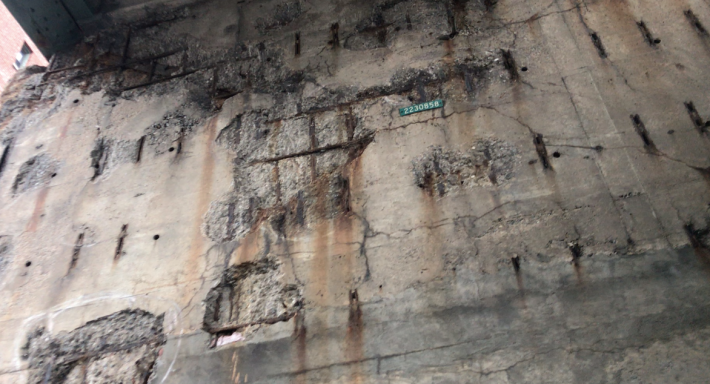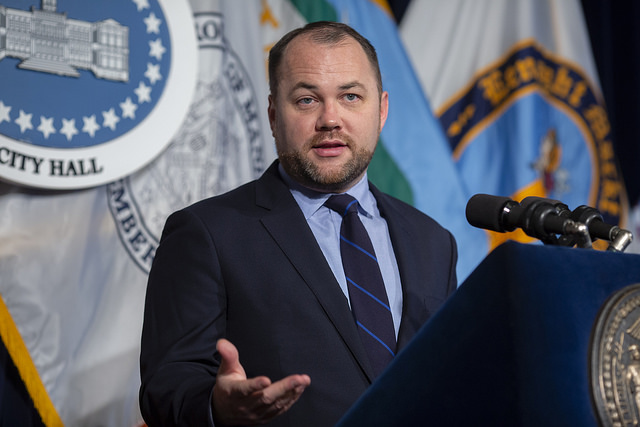Council Speaker Corey Johnson is demanding that the city rethink its much-reviled plan to tear down and fully replace a short segment of the crumbling Brooklyn-Queens Expressway in Brooklyn Heights — which carries 153,000 gas-guzzling vehicles every day.
In his "State of the City" address on Tuesday, Johnson stopped short of calls from transportation advocates in the Wall Street Journal, and Streetsblog to turn the dangerous, pollution-choked sluice into a sane, safe and sanitary boulevard-style roadway, but argued that there must be a better solution than the current $4-billion plan.
“We need to take a fresh look at the BQE problem, and shouldn't assume the best way forward is the old car-centric way,” the city's second-most important elected official said, as part of a broader effort to close the current leadership gap in the mayor's office on a wide range of street safety issues. “We can't change the past but we can make choices that will lead us to a better future.”
In September, the Department of Transportation proposed two equally expensive — and equally unpalatable — options for rehabilitating the 1.5-mile stretch of the Robert Moses-era triple cantilever between Atlantic Avenue and Sands Street that transportation experts warn could collapse: a temporary six-lane highway on the historic Brooklyn Heights Promenade until a new one is done in six years, or rebuilding the expressway lane by lane, potentially creating traffic jams for up to 12 miles.
But the likely mayoral candidate says the time is now to scrap those proposals, and instead study taking a wrecking ball to the highway, since it’s total capacity over the span of an entire day is still less than the number of straphangers that rely on just one subway line at rush hour.
“The Lexington Avenue subway line carries more passengers than [the BQE] in a morning rush hour,” he said. "The city should study alternatives ... including the removal of the BQE in its entirety."

And the city should not live 70 years in the past, Johnson said, but should think critically about the future and how rebuilding a highway that’s mostly used by private vehicles — only roughly 10 to 13 percent of its total traffic is trucks — contributes to the 30 percent of the city’s carbon emissions caused by transportation, a massive chunk of which is caused by cars.
“We have been living in Robert Moses’s New York for almost a century and it is time to move on,” he said. “Climate change is an existential threat to our city. Thirty percent of New York City’s greenhouse gas emissions are caused by transportation, and 83 percent of those are from private vehicles. That should keep you up at night. If you believe in science — and you believe that climate change is real — join me in this fight. Let’s get people out of private cars.”
As part of the massive BQE project whose about two-year environmental review process is slated to start later this year, the Department of Transportation must also overhaul the city’s reliance on trucks and redesign those routes through community engagement, said Johnson in his 100-page transit report, which accompanied his speech.
“The overhaul of the city’s truck routes is severely overdue,” he said. “The reimagining of the BQE should be coupled with truck route redesign effort and a dramatic expansion of the city’s efforts to increase reliance on freight.”
Tearing down the three-tiered structure and replacing it with a boulevard-style roadway — like the West Side Highway conversion decades ago — could send thousands of vehicles elsewhere and, even down local streets. But it's doable, and could even reduce congestion, create more free space, and boost economic development as it did in other cities that replaced similar elevated expressways with boulevards.
For example, Milwaukee swapped out its Park East Freeway with a boulevard, which created green space equivalent to one-third of Brooklyn Bridge Park and brought in $1-billion in private investments for development projects, according to Johnson's report.
And in Seattle, the cars seemed to just "disappear" when the city tore down its Alaskan Way Viaduct on Jan. 11, which served 90,000 drivers per day.
Department of Transportation Commissioner Polly Trottenberg dismissed Streetsblog out of hand back in November when a reporter told her the time was now to tear down the road. She said that there might be such a time, but it is not today.
"Here’s the challenge: for better or for worse, this roadway right now is carrying 153,000 vehicles a day — a lot of trucks — and a lot of that traffic is within the city," she said. "A lot of trucks are delivering food, furniture goods you name it. … A part of me would love to say we could do without this roadway, but I just think from what we’ve seen even when you see the smallest of delays or crashes on this roadway, the backups can be catastrophic."
On Tuesday, the agency said it is reviewing several options for the BQE, including Johnson's proposal to tear it down entirely.
"We are undertaking a thorough review process that will look at a range of options for this critical transportation corridor, accompanied by substantial community and expert engagement," said spokeswoman Alana Morales.






